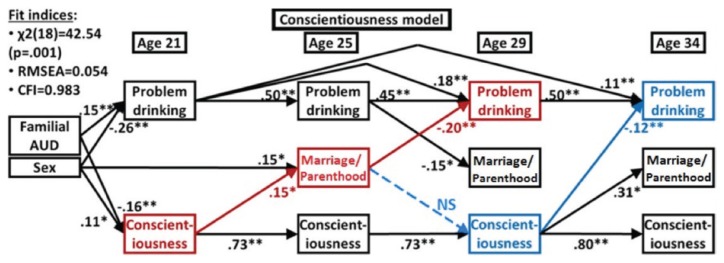Figure 3.
An integrative model of family role and personality effects on young adult maturing out of problem drinking, showing results of a cross-lagged panel model of marriage and parenthood, conscientiousness, and problem drinking across four longitudinal time points. Results of cross-lag models showed some prospective effects of personality on problem drinking, with higher conscientiousness at age 29 predicting lower problem drinking at age 34. Family role transitions mediated personality effects, with higher conscientiousness at age 21 predicting transitions into a family role by age 25, which in turn predicted lower problem drinking at age 29. Note: Colors highlight parts of the model testing hypothesized mediation paths. Red variables and paths highlight results confirming the hypothesized mediation of conscientiousness effects on problem drinking via marriage and parenthood. Blue variables and paths highlight results failing to confirm the hypothesized mediation of marriage and parenthood effects on problem drinking via conscientiousness. For marriage/parenthood: 0 = remained never married and a nonparent, 1 = became married or a parent. For family AUD: 0 = family history negative, 1 = family history positive. For sex: 0 = male, 1 = female. *p < .05. **p < .01. Source: Adapted from Lee MR, Ellingson JM, Sher KJ. Integrating social-contextual and intrapersonal mechanisms of “maturing out”: Joint influences of familial-role transitions and personality maturation on problem-drinking reductions. . 2015;39(9):1775–1787.

